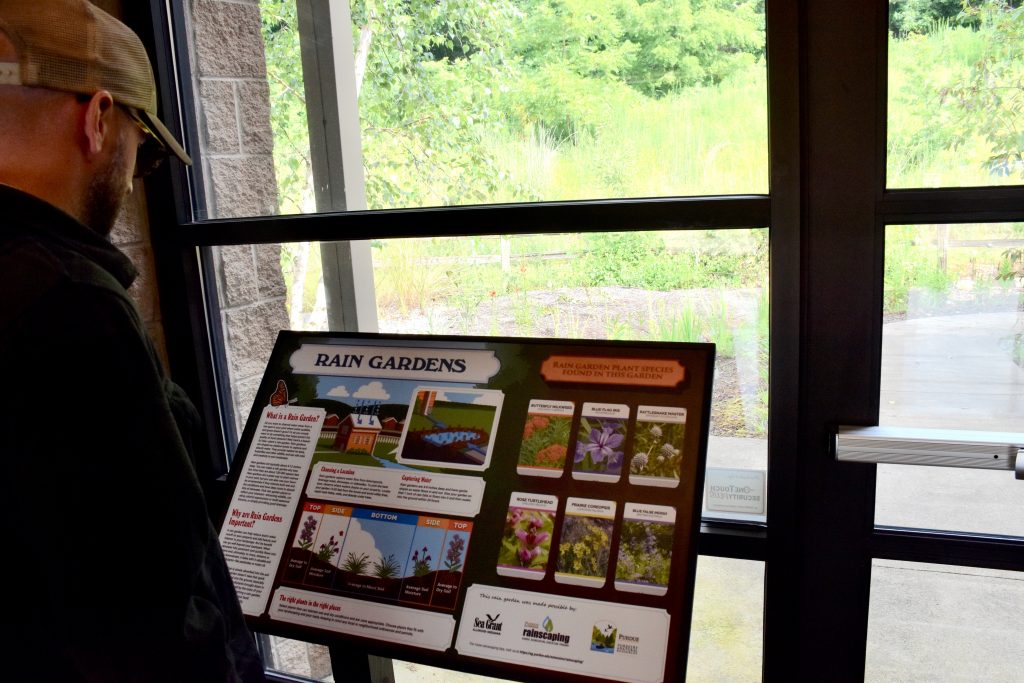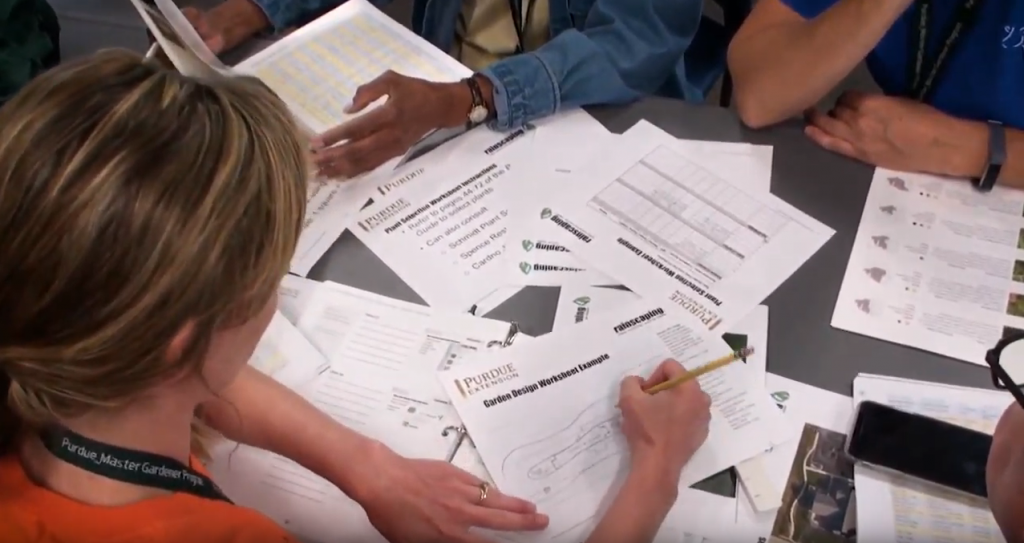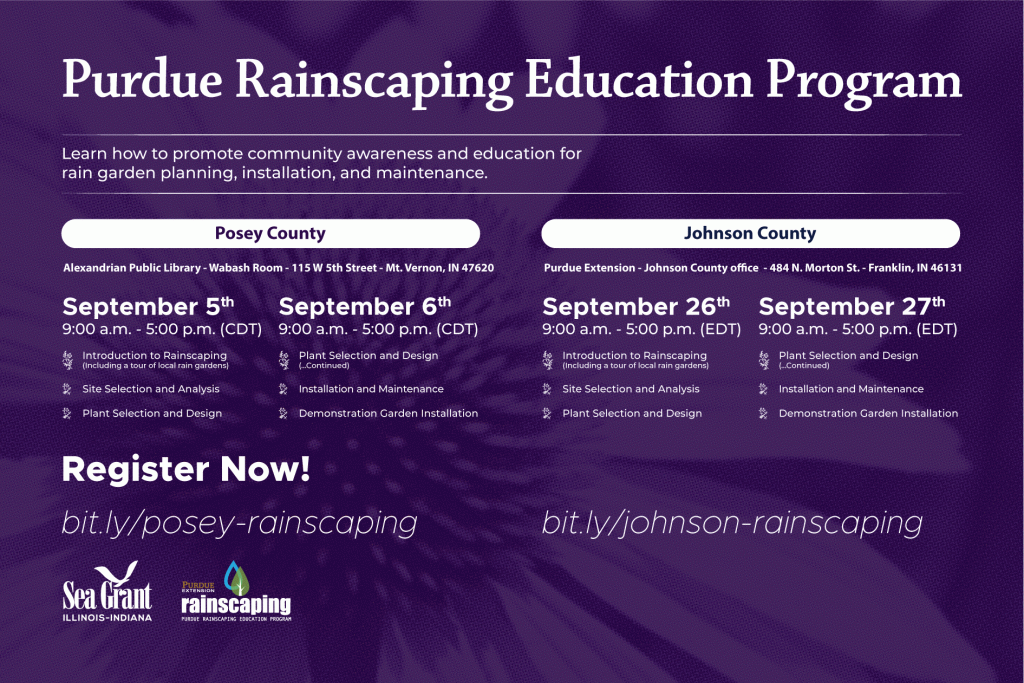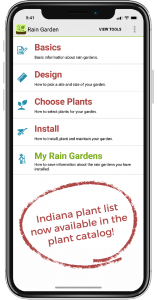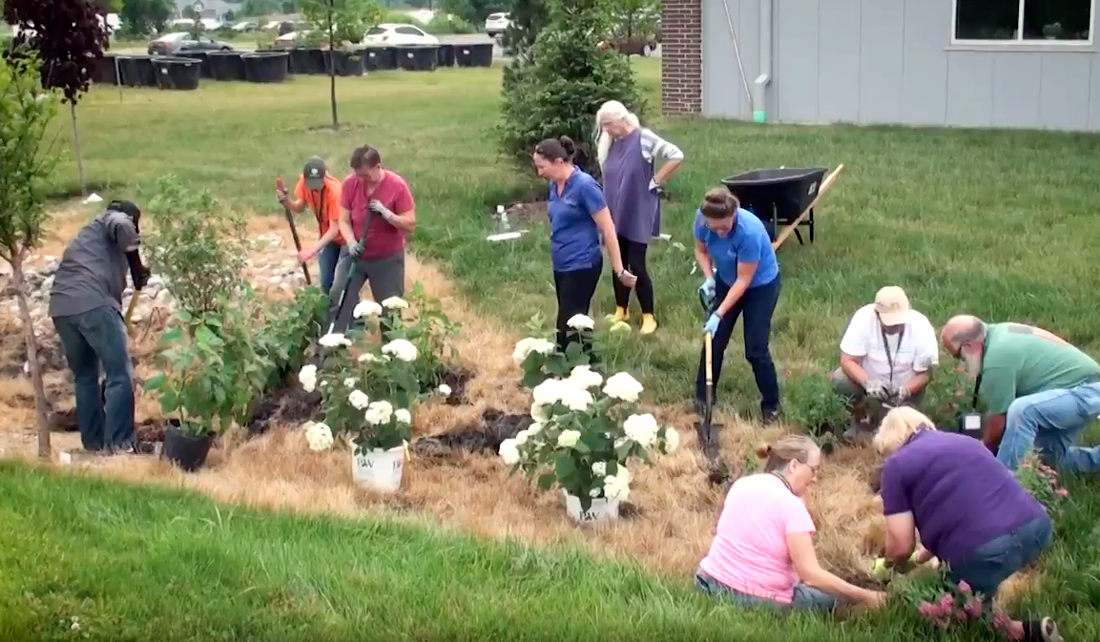
The Purdue Rainscaping Education Program has published a curriculum, led several state-wide workshops and contributed to a rain garden app, all designed to teach communities and residents around Indiana how to use sustainable landscaping to prevent polluted runoff from reaching bodies of water.
The curriculum—which has undergone extensive evaluation, improvements and external peer reviews since pilot testing in 2015-16—includes hands-on activities, interactive discussions and field trips to community rainscaping projects to deepen understanding. Participants learn about the benefits of rain gardens, how to design and plan a garden for their space, choosing plants, installation, maintenance and more.
“Our multidisciplinary rainscaping program covers landscape practices, such as rain gardens directing stormwater to be absorbed by plants and soils, that are of increasing interest among Extension clientele and also our conservation partners,” said Kara Salazar, assistant program leader and extension specialist for sustainable communities at Illinois-Indiana Sea Grant and Purdue Extension. Salazar co-leads the rainscaping program with John Orick, Purdue University Master Gardener state coordinator. Salazar and Orick collaboratively manage the program with a nine-member multidisciplinary team representing campus and state-wide county staff.
The program has facilitated nine 15-hour workshops for 176 participants throughout Indiana since 2016. These workshops give community members and leaders the knowledge and resources they need to implement rainscaping in residential or small public spaces. Extension specialists teach master gardeners, landscape and stormwater professionals, and agency staff members how to promote community awareness and education for rain garden planning, installation and maintenance. Additionally, introductory education presentations for state audiences have provided more than 400 participants with information on the benefits of rainscaping and how to get started with siting, sizing, designing and maintaining rain gardens.
Community members participating in the workshops gain experience by working together to create a demonstration rain garden in a public space. Custom designed interpretive signs are installed with each demonstration to promote education efforts. Participants are encouraged to attend as community teams to support implementation of public education programs and provide technical assistance for homeowners or small-scale public projects on completion of the training.
The program emphasizes connecting participants to resources and partners to support successful community projects tailored to local needs. A rain gardens map on a customized website, featuring an associated database, tracks state-wide rain garden installation projects and calculates related ecological benefits such as reduction in stormwater runoff.
Rain gardens installed as part of training workshops have the capacity to reduce runoff by a combined 319,720 gallons per year. Rain gardens that have been designed, facilitated or installed by participants or their partners will reduce runoff even more. This reduction in flow and associated nutrients can improve water quality.
To further grow the program, the team conducted its first train the trainer workshop for 15 Extension staff members in September of 2017. The goal of these workshops is to educate people throughout the state who can then host rain garden workshops in their communities using program materials. Participants were primarily Purdue Extension educators but also included University of Illinois Extension staff members who recognize the benefit of this program and have requested to implement it in Illinois. Plans are now underway to implement the program for Illinois communities.
“The value in the program lies in how it offers an alternative type of garden that can be beautiful as well as serve a purpose,” said Nikky Witkowski, a Purdue Extension educator in Lake County who has hosted the rainscaping education program there multiple times. “It shows what homeowners can easily do on their land or how commercial operations could use these practices to mitigate problems with stormwater runoff.”
The program will host two more rainscaping workshops in 2019. Salazar and the team will lead training on September 5-6 in Mt. Vernon at the Alexandrian Public Library (registration deadline August 26) and September 26-27 in Franklin at the Purdue Extension Johnson County office (registration deadline September 16).
Participants have reported that they are also using program resources to launch broader rain garden education programs in their own communities. Activities have included rain garden installations, tours, resident assistance community education programs, and exhibitor booths
In addition to finalizing the program curriculum and hosting workshops, the Purdue Rainscaping Education Program has contributed to a smartphone app named “Rain Garden.” The app is designed to help people plan and build rain gardens across America and is now customized with a specialized list of plants for Indiana. Through video tutorials, diagrams and tools, the app makes it easy to learn the basics of designing, installing and maintaining a rain garden.
Hoosiers can download Rain Garden for free through the Apple or Google app store. Created at the University of Connecticut, the app includes tools for determining soil type, measuring the area needed for a garden and managing multiple rain garden projects.
Illinois-Indiana Sea Grant is a part of University of Illinois Extension and Purdue University Extension.
Writer: Hope Charters
Source: Kara Salazar

